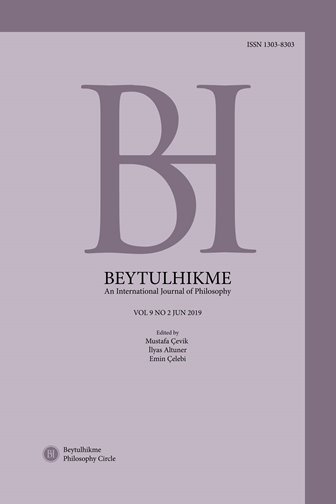Author :
Abstract
Dinî ve felsefî alanda en çok tartışılan konulardan biri olan kötülük meselesi, antik çağdan günümüze teolog ve filozoflar nezdinde farklı düzlemlerde ve farklı paradigmalar ekseninde ele alınmış, konuyla ilgili birçok argüman geliştirilmiştir. Aristoteles şârihi ve İslam filozofu İbn Rüşd ise, kötülük konusunu dinî referanslar çerçevesinde ve Aristoteles’in izinde dinî/kelâmî ve felsefî boyutlarıyla ele almıştır. O bu konuda kelâm mezheplerinden Eş‘arîlerin, felsefecilerden ise Sofistlerin görüşlerine karşı durmuştur. Ancak İbn Rüşd, kötülük meselesiyle ilgili müstakil bir risale veya eser kaleme almadığından konuyla ilgili bilgiler eserlerinde pasajlar hâlinde dağınık bir şekilde bulunmaktadır. Bu minvalde, kötülük meselesiyle ilgili bilgilerin İbn Rüşd’ün eserlerinde dinî, kelâmî ve felsefî bağlamlarda parçacı bir yaklaşımla ele alınması, onun temel argümanlarını belirlemede en büyük zorluğu oluşturmaktadır. Bu çalışma, İbn Rüşd’ün kötülükle ilgili yaklaşımlarını bütüncül bir bakış açısıyla, hayır, şer, rölativizm, hidâyet, dalâlet, ontoloji, fenomenoloji, inâyet ve madde kavramları etrafında ele almaktadır.
Keywords
Abstract
Evil, one of the most debated issues in the religious and philosophical field, has been dealt with in different planes and different paradigms by the theologians and philosophers from antiquity to the present and many arguments have been developed. Ibn Rushd, Islamic philosopher and Aristotle commentator, addressed the issue of evil within the context of religious references and in the footsteps of Aristotle, with religious/theological and philosophical dimensions. He opposed the views of theological Ash?arite school and Sophists. However, since Ibn Rushd did not write an independent tractate or a work on the issue of evil, the information related to the subject is found as scattered passages in his works. In this respect, the fact that the knowledge regarding the issue of evil is treated in the works of Ibn Rushd in the religious/philosophical and philosophical contexts with a fragmentary approach constitutes the greatest difficulty in determining his basic arguments. This article discusses Ibn Rushd's ideas regarding the evil around the concepts of goodness, evil, relativism, hidayah (God-inspired guidance) heresy -ontological, phenomenological inayah (divine grace) and matter with a holistic perspective.
Keywords
- Adıgüzel, N. (2002). Meşşai İslam Filozoflarında “Tabiat” Kavramı. Dini Araştır- malar, 13, 41-56.
- Algül, F. (2013). İbn Rüşd’de Kötülük Problemi ve Teodise. (YL Tezi). Sivas: Cumhuri- yet Üniversitesi SBE.
- Aristoteles (1996). Metafizik. (Çev. A. Arslan). İstanbul: Sosyal Yayınlar.
- Bolay, S. H. (1990). Felsefi Doktrinler Sözlüğü. Ankara: Akçağ Yayınları.
- Câbirî, M. A. (1999). Arap-İslam Kültürünün Akıl Yapısı. (Çev. B. Köroğlu, H. Hacak, E. Demirli). İstanbul: Kitabevi.
- Câbirî, M. A. (2000). Arap-İslam Aklının Oluşumu. (Çev. İ. Akbaba). İstanbul: Kitabevi.
- Cengiz, L. (2006). İbn Rüşd’de Uluhiyet Problemi. (Doktora Tezi). Konya: Selçuk Üniversitesi SBE.
- Deniz, G. (2017). İnsan Hürriyetinin Metafizik Temelleri. İstanbul: Litera Yayıncılık.
- Fahri, M. (1992). İslam Felsefesi Tarihi. (Çev. K. Turhan). İstanbul: İklim Yayın- ları.
- Hourani, G. F. (2015). İbn Rüşd’ün İyi ve Kötü Üzerine Görüşleri. (Çev. M. S. Saruhan). İslami Araştırmalar, 26 (3), 107-119.
- İbn Rüşd (1986). Tehâfüt et-Tehâfüt. (Çev. K. Işık, M. Dağ). Samsun: Ondokuz Mayıs Üniversitesi Basımevi.
- İbn Rüşd (1998). ed-Darûrî fi’s-Siyâse: Muhtasar Kitâbi’s-Siyâse li-Eflâtun. (Tah. A. Şehlan). Beyrut: Merkez Dirâseti’l-Vahdeti’l-Arabiyye.
- İbn Rüşd (2011). Siyasete Dair Temel Bilgiler: Kurtubalı İbn Rüşd’ün Platon’un Dev- let’ine Düştüğü Şerh. (Çev. M. H. Özev). İstanbul: Bordo Siyah Kültür Yayın
- İbn Rüşd (2012). el-Keşf an Minhâci’l-Edille. (Çev. S. Uludağ). Felsefe ve Din İlişkileri. İstanbul: Dergâh Yayınları.
- İbn Rüşd (2016). Aristoteles Metafizik Büyük Şerhi I. (Çev. M. Macit). İstanbul: Litera Yayıncılık.
- İbn Rüşd (2017). Metafizik Şerhi. (Çev. M. Macit). İstanbul: Litera Yayıncılık.
- İbn Sina (2011). Metafizik I-II. (Çev. E. Demirli, Ö. Türker). İstanbul: Vakıflar Genel Müdürlüğü Yayınları.
- Kiriş Yılmaz, N. (2012). Sofistler ‘Sofist’ miydi? SDÜ Fen Edebiyat Fakültesi Sosyal Bilimler Dergisi, 25, 163-178.
- Koç, E. (1994). Görünüş ve Gerçeklik. Araştırma: Ankara Üniversitesi Dil ve Tarih- Coğrafya Fakültesi Felsefe Bölümü Dergisi, 34, 235-243.
- Leaman, O. (1998). Averroes and his Philosophy. London: Curzon Press.
- Öçal, Ş. (2015). Sofistler ve Sokrates. Doğu’dan Batı’ya Düşüncenin Serüveni 2. (Ed. B. A. Çetinkaya). İstanbul: İnsan Yayınları, 117-140.
- Özdemir, M. (2014). İslam Düşüncesinde Kötülük Problemi. İstanbul: Kaknüs Yayın-
- Platon (2014). Protagoras. (Çev. T. Gökçöl). Diyaloglar. İstanbul: Remzi Kitabevi.
- Plotinus (2018). Kötü’nün Doğası ve Kökeni Üzerine. (Çev. M. M. Karakaya). Eskiyeni, 37, 153-177.
- Şimşek, O. (2007). İbn Rüşd’ün İbn Sina’yı Eleştirisi. (YL Tezi). Bursa: Uludağ Üni- versitesi SBE.
- Taşkın, A. (2003). Sofistlere Özel Bir Referansla Bilginin Kaynağı ve İmkânı Üze- rine Yapılan Tartışmalar. Cumhuriyet Üniversitesi İlahiyat Fakültesi Dergisi, 7 (1), 199-209.
- Uçak, Ö. (2006). Felsefi Farklılaşma Sorulardan Değil Cevaplardan Doğar: Sofist- ler ve Platon. Felsefe ve Sosyal Bilimler Dergisi, 1, 69-76.
- Waterfield, R. (2000). The First Philosophers. Oxford: Oxford University Press.
- Yıldırım, Ö. A. (2012). İslam Düşüncesindeki Yoktan Yaratma ve Kıdem Tartış- maları: Kelamcılar ve İbn Sînâ Merkezli Bir İnceleme. Kelam Araştırmaları, 10 (2), 251-274. Öz: Dinî ve felsefî alanda en çok tartışılan konulardan biri olan kötülük meselesi, antik çağdan günümüze teolog ve filozoflar nezdinde farklı düzlemlerde ve farklı paradigmalar ekseninde ele alınmış, konuyla ilgili birçok argüman geliştirilmiştir. Aristoteles şârihi ve İslam filozofu İbn Rüşd ise, kötülük konusunu dinî referanslar çerçevesinde ve Aristoteles’in izinde dinî/kelâmî ve felsefî boyutlarıyla ele almıştır. O bu konuda kelâm mezheplerinden Eş‘arîlerin, felsefecilerden ise Sofistlerin görüşlerine karşı durmuştur. Ancak İbn Rüşd, kötülük meselesiyle ilgili müstakil bir risale veya eser kaleme almadığından konuyla ilgili bilgiler eserlerinde pasajlar hâlinde dağınık bir şekilde bulunmaktadır. Bu minvalde, kötülük meselesiyle ilgili bilgilerin İbn Rüşd’ün eserlerinde dinî, kelâmî ve felsefî bağlamlarda parçacı bir yaklaşımla ele alınması, onun temel argümanlarını belirlemede en büyük zorluğu oluşturmaktadır. Bu çalışma, İbn Rüşd’ün kötülükle ilgili yaklaşımlarını bütüncül bir bakış açısıyla, hayır, şer, rölativizm, hidâyet, dalâlet, ontoloji, fenomenoloji, inâyet ve madde kavramları etrafında ele almaktadır. Anahtar Kelimeler: Tanrı, İbn Rüşd, kötülük, sofist, Eş’ari, inayet.





